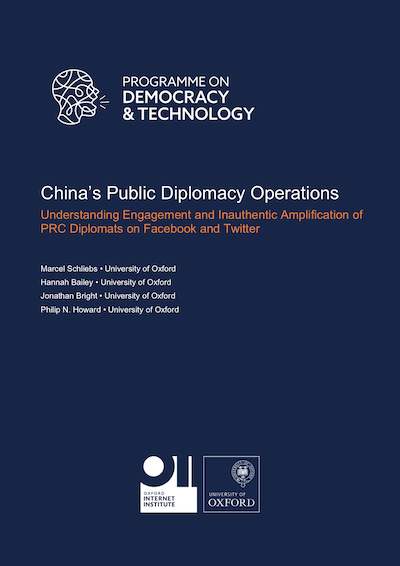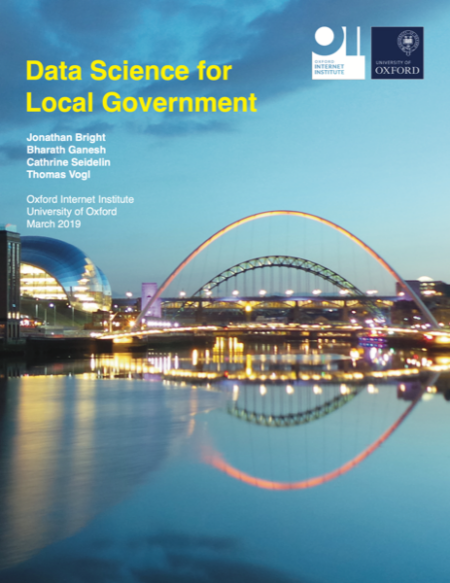


Jonathan Bright was an Associate Professor and Senior Research Fellow at the Oxford Internet Institute. He specialises in computational approaches to the social and political sciences. He has two major research interests: exploring the ways in which new digital technologies are changing political participation; and investigating how new forms of data can enable local and national governments to make better decisions.
Social media, news, political behaviour, computational social science, big data


DemTech investigates the use of algorithms, automation, and computational propaganda in public life.

This project builds on existing data science to understand the extent to which credible public health information is outweighed by false content on social media and measure the effectiveness of public health communication responses in real‐time.

The core of this project is the development of a prototype digital platform which would flexibly allow for the measurement of trends in online hate speech in different languages, countries, and contexts.
In the past five years my work has been financially supported by UK taxpayers, the UK’s Economic and Social Research Council, the John Fell Fund, the Luminate Group, Innovate UK, NERC, the Wiener-Anspach Foundation, ERA-NET Joint Programming Initiative (European Commission), the EC 7th Framework Programme, the Lloyds Register Foundation (Alan Turing Institute), the Department for Work and Pensions and Google. In that time I have also worked as a consultant for Facebook, DFID and the ICO, and given paid lectures on the Oxford Study Abroad programme and the FCO Indian Leadership Programme.

With Professor Sinan Aral and Dr Jonathan Bright
The OII welcomes Sinan Aral, the David Austin Professor of Management at Massachusetts Institute of Technology (MIT), in conversation about his new book 'The Hype Machine' with Dr Jonathan Bright, a Senior Research Fellow at the OII.

With Dr Scott A. Hale, Dr Jonathan Bright, Dr Chico Camargo, and Private: Dr Graham McNeill
This presentation, hosted by the Alan Turing Institute focuses on using crowd-sourced data, such as OpenStreetMap and Waze, to improve traffic models and better understand the factors contributing to traffic jams and other traffic issues.

With Dr Jonathan Bright
Jonathan Bright explores the impact of social media on news consumption. He examines how social media users choose what to share, how this varies by platform, and what the implications may be for the type of news coverage that people receive.

With Dr Victoria Nash and Dr Jonathan Bright
This option course for the OII MSc in "Social Science of the Internet" examines the impact of the Internet and related technologies on the core activities and institutions of government and politics
By Marcel Schliebs, Hannah Bailey, Jonathan Bright, and Philip N. Howard
The Chinese state increasingly employs social media in its public diplomacy efforts. This report by Oxford researchers lays out the vast extent of China’s operations on Twitter, where it controls a huge number of highly active accounts.

By Jonathan Bright, Bharath Ganesh, Cathrine Seidelin, and Thomas Vogl
Data science has the potential to enhance local government services in the UK. This report offers a comprehensive guide to the different types of data science being undertaken, the types of opportunities created, and the challenges being encountered.


19 August 2024
The new government faces an urgent challenge: revitalising the UK's crumbling public services without major increases in public spending. OII researchers propose a roadmap for developing a more productive and equitable public services.
11 May 2021
A new study by researchers at the Oxford Internet Institute, University of Oxford uncovers a coordinated amplification network promoting the Twitter accounts of PRC diplomats based in the United Kingdom.
11 May 2021
A new study by researchers at the Oxford Internet Institute, University of Oxford uncovers a coordinated amplification network promoting the Twitter accounts of PRC diplomats based in the United Kingdom.
3 December 2020
Four members of faculty at the Oxford Internet Institute (OII) have been awarded the title of Associate Professor by the University of Oxford, in recognition of their outstanding contributions to research in the field of social sciences.

The Times, 03 January 2022
Groups spreading misinformation about Covid-19 lockdowns and vaccines are starting to use the same language to spread conspiracy theories about climate change, experts have warned.

The Independent, 26 February 2021
Movement mutating away from original Trump-centric mythology to appeal to anti-establishment suspicion and anti-lockdown discontent in UK, France, Germany and beyond.

The Western Front, 05 February 2021
Trump’s departure from social media reveals bigger problems with these platforms.

DPhil Student
Anna George is a Social Data Science doctoral student who uses computational approaches to study online political behaviour. Her research focuses on the message diffusion of alternative communities such as hate groups and political extremists.

DPhil Student
Marcel is a doctoral candidate in Social Data Science and Researcher at the Computational Propaganda Project. His research is at the intersection of political science, statistics and computer science, with a focus on elections and disinformation.

Former Researcher
Gillian Bolsover researches politics, citizenship and civil society in the modern world, focusing on the changes associated with new media technologies and on producing research that takes into account China and other non-Western populations.

Former MSc Student
Elizabeth Dubois is an OII DPhil alumna. Her research focuses on the role of personal influence in political communication networks.

Former DPhil Student
MSc Thesis: Political participation in non-political online communities: The role of sense of community in fostering political participation Supervisor: Dr Vili Lehdonvirta Completed: 2014

Former DPhil Student
Julia was an OII DPhil student interested in tabloidization, online journalism, journalism and democracy, public sphere, corpus linguistics, and discourse analysis.

Former DPhil Student
Yin is fascinated by the intersection between language and technology. She researches persuasion in the context of new media, focusing specifically on the rhetoric and resonance of Brexit tweets.

Former Research Associate
Nahema was a doctoral candidate at the Oxford Internet Institute and a researcher at the Computational Propaganda Project.